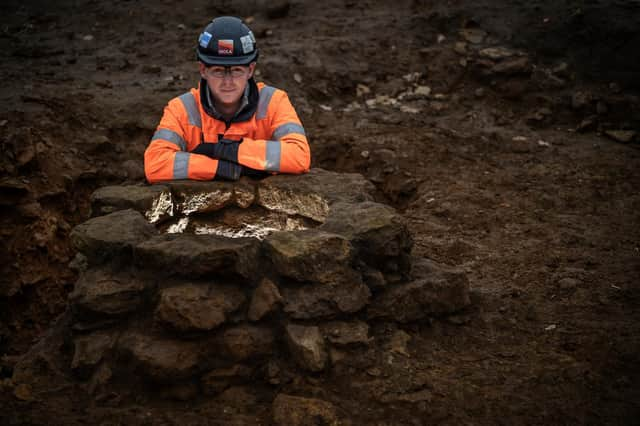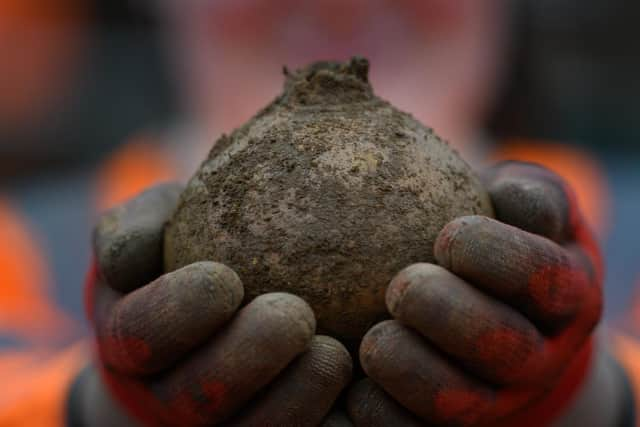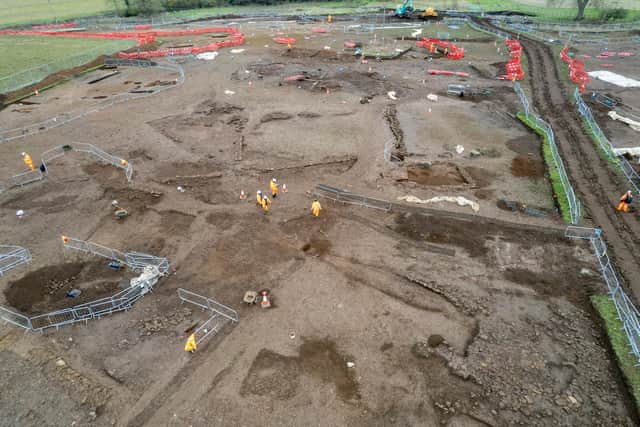Huge Roman archaeological site discovered in Northamptonshire village as part of HS2 work


A huge Roman archaeological site has been discovered in a Northamptonshire village as part of HS2 work.
Since the beginning of last year, a team of around 80 archaeologists have been excavating an Iron Age village that developed into a wealthy Roman trading town in Chipping Warden in South Northamptonshire.
Advertisement
Hide AdAdvertisement
Hide AdThe presence of such a significant archaeological site in the area has been known since the 18th century, and initial survey and analysis by HS2 gave some indication of what could be discovered there.
The original use of the site, known as Blackgrounds after the black soil found there, began in the Iron Age when it was a village formed of over 30 roundhouses, which have been uncovered alongside an Iron Age road.
Evidence from the dig shows that the settlement expanded over time becoming more prosperous during the Roman period, with new stone buildings and new roads emerging, including one 10 metre wide Roman road.
The road indicates that the settlement would have been very busy with carts simultaneously coming and going to load and unload goods and the more than 300 Roman coins, discovered as if lost or discarded, are an indication that a significant volume of commerce was passing through this area.
Advertisement
Hide AdAdvertisement
Hide AdJames West, MOLA site manager said: “This is certainly one of the most impressive sites MOLA Headland Infrastructure has discovered whilst working on the HS2 scheme.


“A particular highlight for me has been understanding the emerging story of Blackgrounds, which we now know spans multiple time periods.
“Uncovering such a well-preserved and large Roman road, as well as so many high quality finds has been extraordinary and tells us so much about the people who lived here.
“The site really does have the potential to transform our understanding of the Roman landscape in the region and beyond.”
Advertisement
Hide AdAdvertisement
Hide AdAlongside coinage, the wealth of the settlement’s inhabitants can be seen in the finds uncovered during the dig, which include glass vessels, highly decorative pottery, jewellery and even evidence of make-up. Traces of the mineral galena, lead sulphide, was found on the site – a substance that was crushed and mixed with oil as make up.


Another discovery in the dig has been half a set of shackles, similar to those recently found at an excavation in Rutland.
Unlike those uncovered in Rutland, the shackles found at Blackgrounds are not associated with a burial but may suggest the presence of either criminal activity or slave labour.
Mike Court, lead archaeologist for HS2, added: “As we near the end of our archaeological field work between London and Birmingham, we have made some unprecedented discoveries, which we will continue to share with communities near our works.
Advertisement
Hide AdAdvertisement
Hide Ad“The opportunity to carefully examine a site such as Blackgrounds, and map out a long history of the site, brought to life through artefacts, building remains and roads, has enabled us to provide a more in depth understanding of what life was like in rural South Northamptonshire in the Iron and Roman Age.”
The removed artefacts are being cleaned and analysed by specialists from MOLA Headland Infrastructure and the details of the buildings and layout of the settlement are being mapped.
The history of the site, from the Iron Age to the Roman era, features in the new BBC Digging for Britain series, hosted by Professor Alice Roberts.
The episode featuring the Blackgrounds dig will air on BBC Two tonight (January 11) at 8pm.